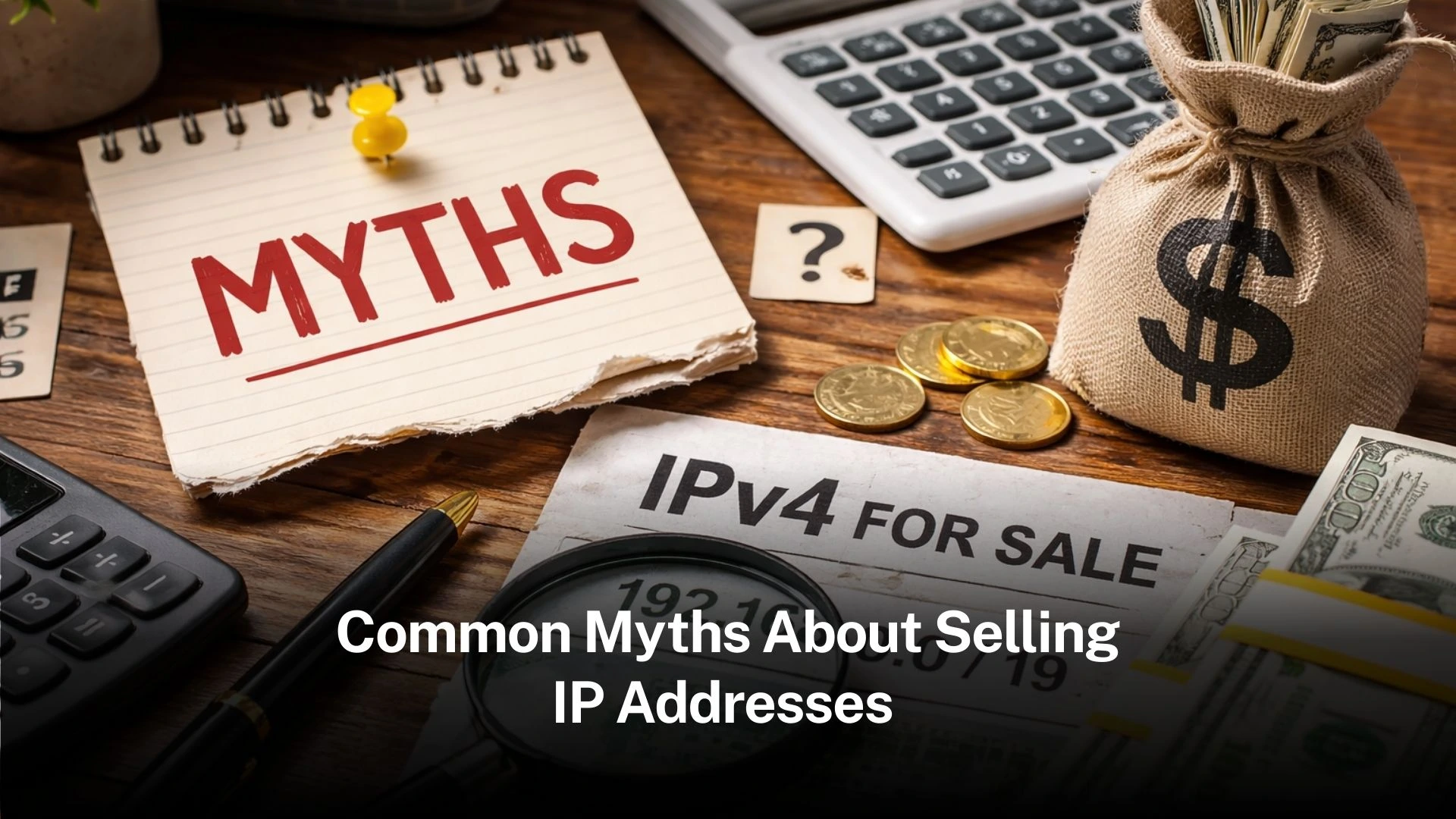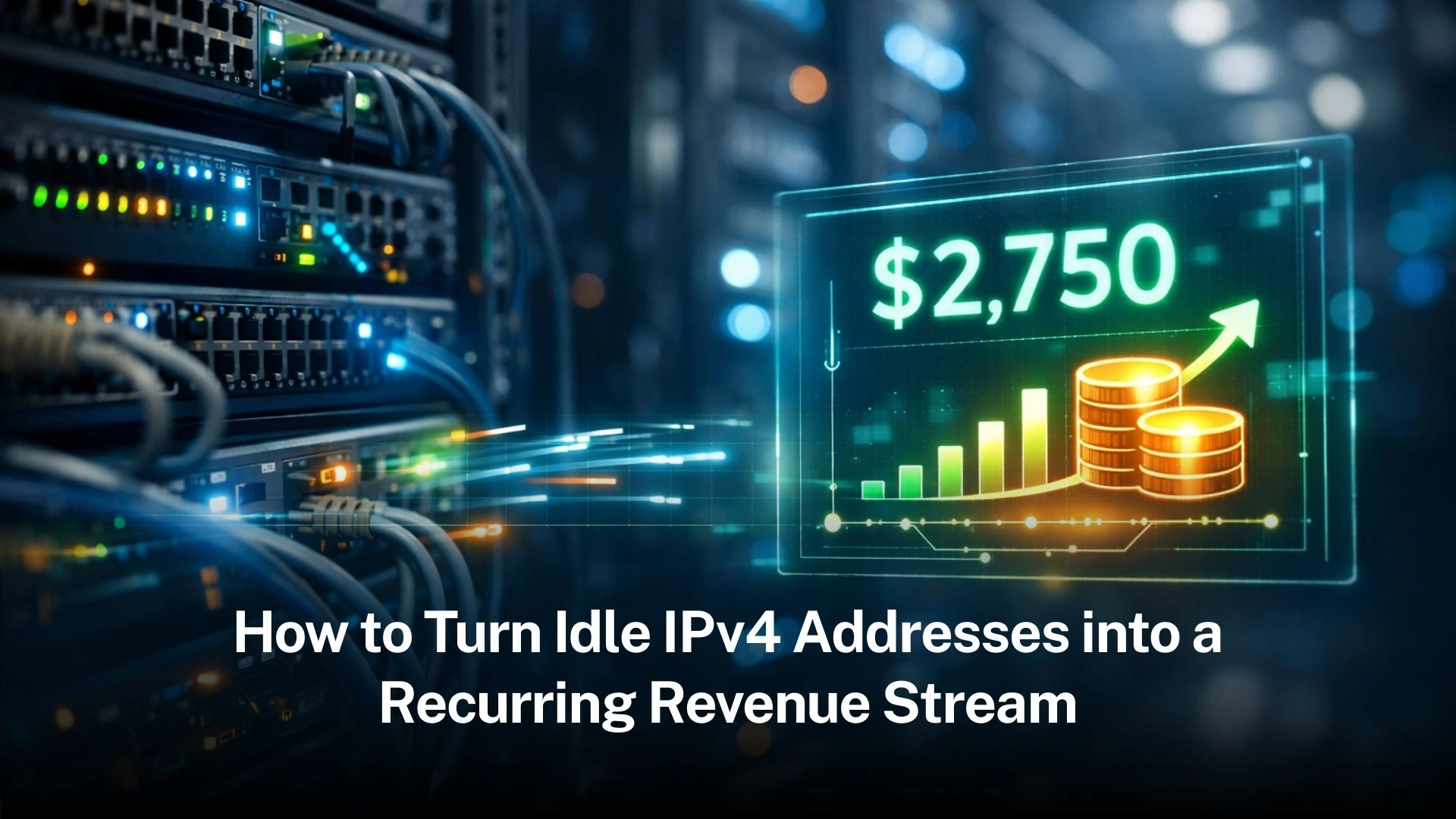Top 5 Benefits of Leasing IP Addresses for Global Businesses

- Leasing IP addresses offers scalable, cost‑effective access to address space without the burden of ownership.
- It enables global businesses to improve performance, localisation and security across multiple regions.
Table of Contents
What does leasing IP addresses mean for global businesses?
Instead of buying IPv4 or IPv6 blocks altogether, leasing entails renting them from a supplier. This provides quick access to address space across several areas, which is essential for multinational corporations given the shortage of IPv4. Through leasing, expansions and short-term requirements can be easily met by transferring the cost from a significant capital investment to a manageable operational outlay. Renting or leasing addresses from Regional Internet Registries (RIRs) and brokers has become a common tactic since the IPv4 free pool has been completely exhausted.
Immediate scalability without large capital outlay
One of the strongest advantages of leasing IP addresses is financial flexibility. Instead of spending tens or hundreds of thousands of pounds to buy /18 or /19 blocks, businesses can rent the exact number of addresses needed, on demand. A recent analysis shows that leasing IPv4 addresses costs between US$0.30 and US$2.50 per IP per month, whereas purchasing even a small block may cost US$35 to US$60 per address. This is particularly valuable for start‑ups or organisations launching temporary infrastructure, as it reduces upfront costs and enables better use of budget elsewhere.
Geographic diversity and improved localisation
For global operations, having IP addresses that appear located in target markets can significantly improve service delivery. Leasing allows organisations to obtain IP blocks from different regions quickly. Pacific Connect points out that geographic diversity helps build a localised online presence and supports region‑specific marketing or content strategies. Whether it is a CDN needing presence in several continents or an e‑commerce platform aiming to appear “local”, leasing delivers geographic agility.
Speed of deployment and operational agility
When buying IP blocks, the process can take weeks or months, involving registry transfer and complex paperwork. Leasing is much quicker, with leasing platforms offering setup within days or even hours. LARUS boasts delivery of IPv4 address space within 48 hours, including Letter of Authorisation and global routing setup. This immediacy is key for businesses reacting to sudden capacity needs, whether launching marketing campaigns, extending infrastructure to new sites, or scaling support during peak seasons.
Address hygiene and security operations
Reputable leasing providers perform black‑list checks and offer abuse management services to protect clients from misbehaving IP ranges. InterLIR explains that leased blocks are carefully vetted and validated to ensure clean history. This is essential for entities sending email or managing private networks—weighing reputation and compliance risks. Leasing providers often include monitoring and routing protection, reducing management overhead and protecting customers’ services from hijacking or abuse.
Flexible lease terms and predictable budgeting
Leases usually offer an easy path to scale up or down. Unlike outright purchase, where addresses could remain unused, leases can be adjusted to align with demand. InterLIR cites flexibility and reduced risk of overcommitment as key advantages of leasing over buying. Pacific Connect highlights another benefit—leasing frees capital that can be invested elsewhere, offering immediate cost savings. As a result, leased assets become an operational expense, possibly with tax advantages over capital expenditure.
Operational considerations and best practise
While the advantages are compelling, leasing IP addresses carries important considerations. Organisations must carefully evaluate lease terms, compatibility with existing infrastructure, reputation history, lease break clauses and provider support. InterLIR warns that some providers may impose usage restrictions that might affect route policies or address portability. To get the most value, treat leasing as part of an overall IP strategy—choose clean addresses, align lease duration to business goals, and ensure providers offer global routing and RPKI/WHOIS updates. Excellent brokers like LARUS, IPv4.Global and Prefix Broker play a key role in these processes.
Leasing compared to purchasing: a cost analysis
Cost‑benefit analysis demonstrates that leasing becomes less economical if used longer than around 3 to 4 years. According to PubConcierge, leasing might cost US$12 per IP in one year (at US$1/month), while a purchase at US$50 per IP becomes cost‑effective around the 4‑year mark. The break‑even timeframe depends on lease duration and business needs. For long‑term projects, purchasing may be preferable, but leasing remains advantageous for flexible and temporary deployments.
Supporting IPv6 transition
While IPv4 remains dominant, especially in legacy systems, IPv6 adoption continues. Leasing providers increasingly support IPv6 address leasing as well. Lease Packet offers both IPv4 and IPv6 leasing, allowing global businesses to future‑proof their infrastructure as part of a dual‑stack or IPv6‑first strategy.
FAQs
1. What is the main difference between leasing and buying IP addresses?
Leasing involves renting address blocks as a flexible operational expense. Buying gives ownership as a capital asset but requires high upfront cost and long‑term commitment.
2. How quickly can a business get leased IP addresses?
Many providers, such as LARUS, promise setup and allocation within 48 hours after paperwork is complete .
3. Are leased IP addresses safe to use?
Yes, if sourced from reputable providers. Brokers conduct blacklist checks and set up abuse‑management frameworks to ensure address integrity.
4. When does leasing become more expensive than buying?
Based on current rates, leasing surpasses the cost of buying around the three to four year mark per IP address.
5. Can leased IP addresses handle global operations?
Absolutely. Leasing allows businesses to rent IP blocks from different regions, enabling localisation, compliance and better end‑user performance.
Related Posts

Common Myths About Selling IP Addresses
The IPv4 secondary market is often shrouded in mystery, leading many organizations to sit on valuable digital assets because they fear the perceived complexity or legal “gray areas.” As IPv4 exhaustion becomes a permanent reality, the value of these addresses has skyrocketed, yet misconceptions continue to stall potential transactions. At i.lease, powered by the real-world expertise of LARUS, we’ve seen how these myths prevent companies from unlocking significant capital.Read more Related Posts Common Myths About Selling IP Addresses The IPv4 secondary market is often shrouded in mystery, leading many organizations to sit on valuable digital assets because they Read more How to buy IPv4 addresses through a certified IP broker Buying IPv4 space requires policy compliance, verified need, and registry approval, making certified IP brokers essential guides through complex global Read more What happens when IP resources are mismanaged Poor IP resource management can lead to outages, security breaches, blacklisting, legal exposure and reputational damage across networks and business Read more .related-post {} .related-post .post-list { text-align: left; } .related-post .post-list .item { margin: 5px; padding: 10px; } .related-post .headline { font-size: 18px !important; color: #999999 !important; } .related-post .post-list .item .post_thumb { max-height: 220px; margin: 10px 0px; padding: 0px; display: block; } .related-post .post-list .item .post_title { font-size: 16px; color: #3f3f3f; margin: 10px 0px; padding: 0px; display: block; text-decoration: none; } .related-post .post-list .item .post_excerpt { font-size: 13px; color: #3f3f3f; margin: 10px 0px; padding: 0px; display: block; text-decoration: none; } @media only screen and (min-width: 1024px) { .related-post .post-list .item { width: 30%; } } @media only screen and (min-width: 768px) and (max-width: 1023px) { .related-post .post-list .item { width: 90%; } } @media only screen and (min-width: 0px) and (max-width: 767px) { .related-post .post-list .item { width: 90%; } }

How to buy IPv4 addresses through a certified IP broker
Buying IPv4 space requires policy compliance, verified need, and registry approval, making certified IP brokers essential guides through complex global transfers. IPv4 transactions are regulated transfers, not simple purchases — registries must approve documentation, justification and registration changes. Certified brokers reduce risk and delay by aligning buyers with registry policy, routing legitimacy and cross-region requirements. Why companies still need to buy IPv4 addresses The global supply of IPv4 addressesRead more Related Posts Common Myths About Selling IP Addresses The IPv4 secondary market is often shrouded in mystery, leading many organizations to sit on valuable digital assets because they Read more How to buy IPv4 addresses through a certified IP broker Buying IPv4 space requires policy compliance, verified need, and registry approval, making certified IP brokers essential guides through complex global Read more What happens when IP resources are mismanaged Poor IP resource management can lead to outages, security breaches, blacklisting, legal exposure and reputational damage across networks and business Read more .related-post {} .related-post .post-list { text-align: left; } .related-post .post-list .item { margin: 5px; padding: 10px; } .related-post .headline { font-size: 18px !important; color: #999999 !important; } .related-post .post-list .item .post_thumb { max-height: 220px; margin: 10px 0px; padding: 0px; display: block; } .related-post .post-list .item .post_title { font-size: 16px; color: #3f3f3f; margin: 10px 0px; padding: 0px; display: block; text-decoration: none; } .related-post .post-list .item .post_excerpt { font-size: 13px; color: #3f3f3f; margin: 10px 0px; padding: 0px; display: block; text-decoration: none; } @media only screen and (min-width: 1024px) { .related-post .post-list .item { width: 30%; } } @media only screen and (min-width: 768px) and (max-width: 1023px) { .related-post .post-list .item { width: 90%; } } @media only screen and (min-width: 0px) and (max-width: 767px) { .related-post .post-list .item { width: 90%; } }

How to turn idle IPv4 addresses into a recurring revenue stream with iLease
Unlock the hidden value of unused IPv4 addresses with iLease, turning dormant digital infrastructure into a recurring revenue stream while navigating market demand, compliance and risk. Leasing idle IPv4 blocks can generate steady, long-term income without relinquishing ownership. Platforms like i.lease global IPv4 marketplace make it easier to monetise addresses and manage reputation and compliance. why IPv4 addresses still matter Despite the long-anticipated exhaustion of the IPv4 address space — aRead more Related Posts Common Myths About Selling IP Addresses The IPv4 secondary market is often shrouded in mystery, leading many organizations to sit on valuable digital assets because they Read more How to buy IPv4 addresses through a certified IP broker Buying IPv4 space requires policy compliance, verified need, and registry approval, making certified IP brokers essential guides through complex global Read more What happens when IP resources are mismanaged Poor IP resource management can lead to outages, security breaches, blacklisting, legal exposure and reputational damage across networks and business Read more .related-post {} .related-post .post-list { text-align: left; } .related-post .post-list .item { margin: 5px; padding: 10px; } .related-post .headline { font-size: 18px !important; color: #999999 !important; } .related-post .post-list .item .post_thumb { max-height: 220px; margin: 10px 0px; padding: 0px; display: block; } .related-post .post-list .item .post_title { font-size: 16px; color: #3f3f3f; margin: 10px 0px; padding: 0px; display: block; text-decoration: none; } .related-post .post-list .item .post_excerpt { font-size: 13px; color: #3f3f3f; margin: 10px 0px; padding: 0px; display: block; text-decoration: none; } @media only screen and (min-width: 1024px) { .related-post .post-list .item { width: 30%; } } @media only screen and (min-width: 768px) and (max-width: 1023px) { .related-post .post-list .item { width: 90%; } } @media only screen and (min-width: 0px) and (max-width: 767px) { .related-post .post-list .item { width: 90%; } }